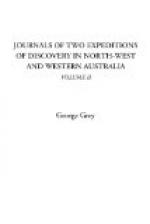Nay, as the European regards the intrusion of any other white man upon the cattle-run, of which European law and usage have made him the possessor, and gets it punished as a trespass, the Aborigines of the particular tribe inhabiting a particular district regard the intrusion of any other tribe of Aborigines upon that district, for the purposes of kangaroo hunting, etc., as an intrusion to be resisted and punished by force of arms. In short this is the frequent cause of Aboriginal, as it is of European wars; man, in his natural state, being very much alike in all conditions—jealous of his rights and exceedingly pugnacious. It is true the European intruders pay no respect to these Aboriginal divisions of the territory, the black native being often hunted off his own ground or destroyed by European violence, dissipation, or disease, just as his kangaroos are driven off that ground by the European’s black cattle; but this surely does not alter the case as to the right of the Aborigines.
UNIVERSALITY OF THIS CUSTOM.
But particular districts are not merely the property of particular tribes; particular sections or portions of these districts are universally recognised by the natives as the property of individual members of these tribes; and when the owner of such a section or portion of territory (as I ascertained was the case at King George’s Island) has determined on burning off the grass on his land, which is done for the double purpose of enabling the natives to take the older animals more easily, and to provide a new crop of sweeter grass for the rising generation of the forest, not only all the other individuals of his own tribe, but whole tribes from other districts, are invited to the hunting party and the feast and dance, or corroboree that ensue; the wild animals on the ground being all considered the property of the owner of the land. I have often heard natives myself tell me, in answer to my own questions on the subject, who were the Aboriginal owners of particular tracts of land now held by Europeans; and indeed this idea of property in the soil, FOR HUNTING PURPOSES, is universal among the Aborigines. They seldom complain of the intrusion of Europeans; on the contrary, they are pleased at their sitting down, as they call it, on their land: they do not perceive that their own circumstances are thereby sadly altered for the worse in most cases; that their means of subsistence are gradually more and more limited, and their numbers rapidly diminished: in short, in the simplicity of their hearts, they take the frozen adder in their bosom, and it stings them to death. They look for a benefit or blessing from European intercourse, and it becomes their ruin.
If I had had a little more leisure I would have written more at length and in a style more worthy of your perusal; but you may take it as certain, at all events, that the Aborigines of Australia HAVE an idea of property in the soil in their native and original state, and that that idea is, in reality, not very different from that of the European proprietors of sheep and cattle, by whom they have, in so many instances been dispossessed, without the slightest consideration of their rights or feelings.




